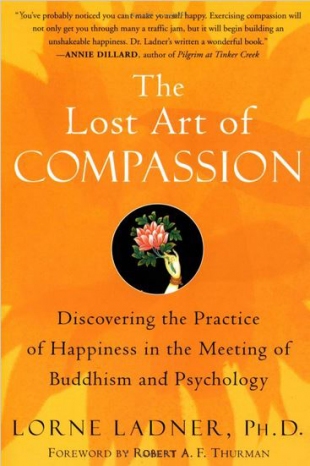"Cultivating compassion and joy is not a linear process; it's organic, like growing flowers. If you work regularly at decreasing your compulsive desires and narcissism while also striving to develop compassion, it is like weeding and then planting, fertilizing, and watering seeds in your garden. Big results do not come immediately. However, if you choose a few of these methods and practice them each day or each week for a while, gradually you will see beautiful results. There is nothing more marvelous than the flowering of compassion in our hearts and relationships."
These wise words come from Lorne Ladner, a clinical psychologist and center director at the Guhyasamaja Buddhist Center in Northern Virginia. He has found that Western psychology can benefit from tapping into the spiritual resources of Tibetan Buddhism with its 1200-year tradition of inner development based on overcoming negative states of mind and cultivating positive ones. To find personal happiness and create a more peaceful world, Ladner believes, we must first transform our hearts.
Compassion is a state of mind and heart. Some of the obstacles to its cultivation are the compulsive desire to be liked and accepted by others, not taking care of ourselves, and self-hatred. The art of compassion means coming to terms with boundaries and impermanence. It also requires that we learn to develop equanimity, the even-mindedness that is such a strong element in Tibetan Buddhism. Ladner presents spiritual exercises designed to help individuals see through the projections they foist upon friends, enemies, and strangers. Overcoming these is also part of the art of cultivating a radiant heart and empathetic understanding of others.
In one of the most startling chapters, Ladner points out that gratitude and sensing one's own inner wealth are important practices for developing contentment and compassion. The author notes: "I remember once hearing that when the Carnegies began practicing philanthropy their wealth was so vast and was increasing so quickly that they couldn't find charities fast enough to keep up. No matter how busy they were giving money away, the wealth grew faster than they could give it. I think this is a great metaphor for what the heart of a bodhisattva is like. By cultivating sincere and powerful gratitude, each of us can increase our inner wealth until we reach a point where we move beyond our own tendencies to feel depleted, burned out, or exhausted. We can become our true inner philanthropists."
It is these kinds of insights that make this spiritual resource so valuable. Best of all is a 17-page summary of compassion practices at the end of the book. Here are Buddhist influenced practices for self-analysis, letting go of desire, integrating projected aspects of the psyche, being honest, remembering the kindness of parents, and many more.
